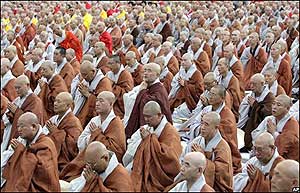
|
|
|
Home Asia Pacific North Asia S/N Korea News & Issues South Korea: President Must Reassure BuddhistsChosun Ilbo, Sept 4, 2008Seoul, South Korea -- The conflict between the government and Korea’s largest religious group has lasted for more than two months. On July 3, Buddhist demanded that officials involved in what they see as discrimination are fired and basic remedies offered.
Grand National Party chairman Park Hee-tae notes flaws in the administration's responses on a daily basis, and lawmakers suggest that the administration deal with the issue more actively. But there is no sign that the government is doing anything other than mutter of “misunderstandings” and repeat that the president has already expressed regret. No wonder there are concerns that the administration does not realize how serious the situation is. All religions exist on the foundation of saving mankind. Because religions embrace such a basic human problem, conflicts between religions preaching limitless love and unending mercy invite extreme dichotomies, dividing people involved in disputes into good and evil. That is why conflict between religions ignite annihilating hatred and lead to bloodshed.
The Korean Constitution stipulates that no state religion is recognized and that religion is separate from politics. It is because of that historical lesson that most modern states uphold separation of religion from politics. The administration must take positive steps to alleviate the growing unease in our minds. A stitch in time saves nine, they say, and with good reason. If a mishap is repeated time after time, it takes on the appearance of intent. Take the omission of temples from a public transport information site covering the Seoul metropolitan area, prepared by the Ministry of Land, Transport and Maritime Affairs: the same thing was repeated in an online map prepared by the Ministry of Education, Science and Technology. Judgement on government actions is often passed based on subjective and emotional factors, and protestations that the government “didn’t mean it” fall on deaf ears. Thus the suspicion that a certain religious group was favored in appointments to important government posts, the invitation to the presidential office of other religious leaders in the wake of a Buddhist protest rally, the appearance of the police commissioner in a poster for an evangelical event, and a rude search of a car in which the leader of the Jogye Order was traveling: they add up to a pattern. Separately, all the incidents may have been accidents and misunderstandings, but it is hard to congratulate the government for having done the right thing. The president has already said several times that it was all unintentional and has pledged to educate public servants in avoiding bias against any religion. But what is really needed is not some vague program at the working level but a genuine attempt at the highest level to reassure, specifically, Buddhists. Given that the president's own evangelical religion is entangled in the current situation, it would be sensible for Lee, never mind right or wrong, to visit Buddhist leaders and listen to them. Once hearts are pacified, other issues, major and minor, can be resolved through mutual concessions. What both sides should pay particular attention to in the process is mutual respect: they must ensure that no needless provocation or insult to the other’s religion is committed. |
 |
|
| Korean Buddhist News from BTN (Korean Language) |
|
 |
|
|
Please help keep the Buddhist Channel going |
|
| Point
your feed reader to this location |
|

 On Aug. 27, some 200,000 Buddhist monks and laymen held a large-scale rally denouncing the government in the heart of the capital. Yet no way has been found to resolve the conflict.
On Aug. 27, some 200,000 Buddhist monks and laymen held a large-scale rally denouncing the government in the heart of the capital. Yet no way has been found to resolve the conflict.

